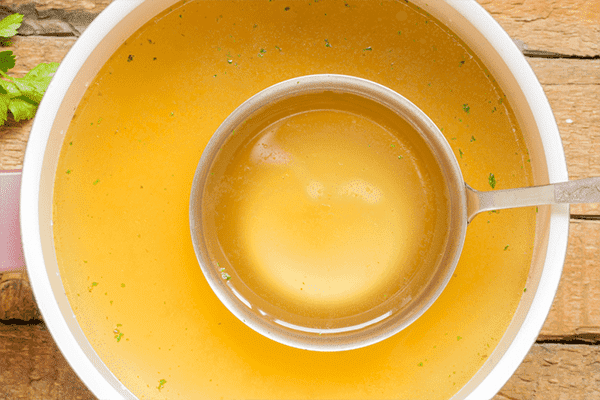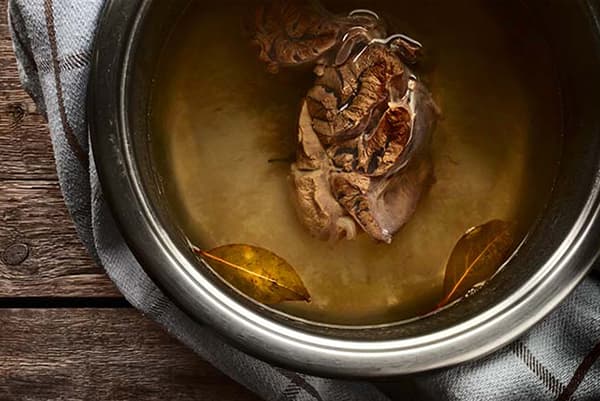Is it possible to dilute the broth with water - why are chefs against it?
Can the broth be diluted with water? Yes, but you need to be prepared that this will affect the taste of the finished dish. A new portion of water will not have time to be saturated with aromas and beneficial substances, which means that the product will feel unrich and diluted. If you do decide to do this, do not forget to follow one important rule - boil the liquid for 1 minute to kill pathogens.

Why is it not advisable to dilute the broth?
Many are sure that adding water to ready-made soup or broth is unacceptable. Such an action actually looks barbaric. It's like adding a little milk to ice cream. After all, in fact, when cooking meat, water is filled with useful substances, fat, spices and becomes a completely different product - broth.
Adding a portion of clean water will lead to the following consequences for the dish:
- Quick spoilage. If the broth is diluted with raw water, it will spoil very quickly. Liquids that have not undergone heat treatment contain billions of microorganisms. Once in a warm nutrient medium, they will begin to multiply intensively. If you do not boil the dish after adding water, it will turn sour within 24 hours and acquire an unpleasant smell and taste.
- Deterioration in taste. It is the change in the taste of the broth after dilution with water that is most often complained about. It becomes somehow insipid, unsaturated, weak.Although some do not notice any changes. Apparently, it all depends on the sensitivity of taste buds, and maybe on the feeling of hunger.
- Reduced concentration of nutrients. It is known that to preserve the taste and beneficial elements inside the meat, it is placed in boiling water. To obtain a tasty broth, on the contrary, the meat is slowly heated so that it gives all the benefits to the water and is thoroughly boiled. By diluting the finished dish with water, we get a low content of nutrients in a large volume of liquid.
Meat broths take a long time to cook, for at least an hour. Therefore, you should always pour in a large supply of water (2-3 times more) and keep the dish on low heat so that the liquid does not boil away too quickly.
What to do with concentrated broth?
There are several ways to get out of the situation with dignity. To prevent dilution of the broth from affecting its taste, choose one of the options:
- Preparing the second broth. The ideal way out of the situation is to take out the meat (mushrooms, fish), add the required portion of water and boil again. You will get a broth called the second one. It is less fatty and is often prescribed for digestive problems.
- Mixing the second and first broth. To make the broth richer, you can mix it with the first one and simmer for 1 minute. The result will be a product that is practically no different in taste from broth cooked according to all the rules.
- Dilute with water and boil for 7–15 minutes. If the cooking time allows you to keep the pan on the fire a little longer, you can safely add water. In 7-15 minutes, the liquids will be completely mixed and saturated with meat aroma and taste.
Please note that when diluting the broth with water, you need to recalculate the added salt and spices. Most likely, you will have to salt the liquid a little so that it does not turn out bland.
Diluting the broth with water is not a good idea. However, when there is no other choice, you can do this. To prevent this from affecting the taste of the dish, you should boil the liquid and add a little salt and spices. And for the future: when cooking meat, you should always take into account that water boils away during the process, and significantly. Therefore, it is better to initially add more of it. Then you won’t have to dilute the valuable product.

Previously, if I added water to the broth, I simply brought it to a boil. The taste was no longer very rich. And it deteriorated faster. I tried boiling the broth for 10 minutes, the broth turned out much tastier.